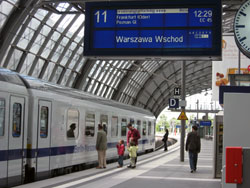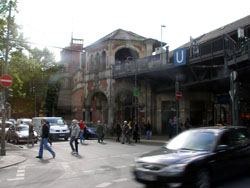Every two weeks, MPC uncovers best practices from around the world and delivers them right to your inbox in Talking Transit. This week, MPC explores the integration of a divided transit network.
When the freedom to move between East and West Berlin was removed with the fall of the Berlin Wall, regional planning was an integral part of reestablishing a unified Berlin. One of the government’s top priorities was to integrate, modernize and expand the municipal and regional transportation networks. But joining Berlin’s divided passenger rail system, road network, and other transit services – which had evolved separately for nearly 30 years -- into one solid, fluid system was no easy task. It was clear the city needed an agency to coordinate regional transportation planning and develop comprehensive multimodal strategies to truly reintegrate Berlin. That agency is Verkenhrsverbund Berlin-Brandenburg (VBB).
The VBB is the regional public transportation authority for the Berlin-Brandenburg district. A private limited company established in December of 1996, the VBB is comprised of representatives of the federal government, the states of Berlin and Brandenburg, 14 separate districts, and four cities. The VBB ensures fluid and cohesive movement of people throughout the region, mediates between policy makers and operators, plans and  executes a unified fare card system, supports operators, and promotes public transit in the region. This agency manages 41 private transit operators that serve approximately 3.4 million passengers every day. All of the represented states, cities and districts contribute to the financing of the regional public transit system managed by the VBB.
executes a unified fare card system, supports operators, and promotes public transit in the region. This agency manages 41 private transit operators that serve approximately 3.4 million passengers every day. All of the represented states, cities and districts contribute to the financing of the regional public transit system managed by the VBB.
Once Berlin’s infrastructure was stabilized, and the city’s transit began to function in a cohesive manner, planners soon found a new dilemma – multiple fare systems. Whether traveling on the U-Bahn, switching to the S-Bahn, taking a short ride on a trolley bus, hopping on a tram, or riding on a ferry, passengers found themselves using multiple tickets, with complicated fare structures that differed from one service provider to the next. The VBB created a unified fare card system in 1999, which allowed people to travel on every mode of local public transit in the region using a single ticket. Fares are collected by the regional agency and redistributed to the operating agencies depending on monthly ridership.

While the universal fare cards apply to all modes of regional transit in Berlin and Brandenburg, smart card technology is not a part of the equation, and the VBB does not have plans for a touch-and-go card any time soon. Instead, the VBB is working with cell phone providers for passengers to tap cell phones before boarding (charging a full fare) and then tap off at their destination with fares adjusted or credited based on the distance they traveled. Fares are charged directly on the person’s cell phone bill and credited to the VBB. While testing is still underway, the VBB’s commitment to efficient and modern services is pushing the envelope by incorporating innovative technologies in their transit network.
The Chicago region has three service providers: Metra, Pace, and the Chicago Transit Authority. While all three agencies use a separate fare collection system, only Pace and CTA have coordinated their fare collection mechanisms to accept each other’s cards. People who need to travel between CTA, Metra, or Pace service areas, find transfers can be difficult, inconvenient and confusing. A regional approach – similar to the VBB’s – would be an appropriate and effective tool for the Chicago region’s transit providers. The Regional Transportation Authority (RTA) has recently discussed the modernization of the fare card system on Metra , as well as studying the possibilities of a universal fare card that would be accepted on all three systems. If we are serious about encouraging more people to use public transit to get to and from their Chicagoland destinations, we have a responsibility to make it easier for them to do it.
This article was featured in Talking Transit, MPC's bi-weekly e-newsletter. To receive the newsletter, visit http://www.metroplanning.org/personalize.asp.